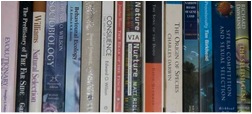Which sources might an interested person read in order to get a general background in the history of evolutionary thought? Certainly, skipping towards the present day makes the most sense. Interested individuals should consider becoming familiar with some of the works by Stephen Jay Gould. For example, his Wonderful Life: The Burgess Shale and the Nature of History (1989) is beautifully written and examines the critical Cambrian explosion and other discontinuities in evolutionary development. The works of Richard Dawkins [e.g. The Selfish Gene (1976)] are thought provoking and are useful in an historical sense. Much of what is currently written is a reaction to his critical thinking.
Acquiring Genomes: A Theory of the Origins of Species (2002) by Lynn Margulis and Dorion Sagan represented a radical rethinking of evolutionary biology with their championing of symbiogenesis. This courageous departure from mainstream thought remains a powerful influence in evolutionary biology.
Sean Carroll in Endless Forms Most Beautiful (2005) lucidly explains the newer concepts of evo-devo, particularly how HOX genes serve conservation of forms.
For those interested in an informative critique of Neo-Darwinism, What Darwin Got Wrong (2010) by Fodor and Piattelli-Palmarini offers a trenchant review of its inadequacies. Speciation (2004) by Coyne and Orr gives an excellent capsule background into modern concepts in speciation. Fox and Wolf, in Evolutionary Genetics (2006) do the same for gaining an initial grounding in genetics. In The Plausibility of Life (2005), Gerhart and Kirschner offer an elegant attempt to find some means for accounting for the failures of the Modern Synthesis through concepts of facilitated variation. Their struggle to offer satisfactory answers, just like Dawkins, is pertinent to our ongoing debate.
Arguably, the best of the current works is the thin volume by James Shapiro, Evolution: A View from the 21st Century (2011). His concepts of natural genetic engineering, which are wholly part of hologenomic evolution theory, are explained in careful and rich detail.
All of these sources have been critical to the formulation of hologenomic evolutionary theory and I consider myself indebted to all of them. Each has contributed brilliantly to a field in which there is never final truth.
 The Microcosm Within | Modern Theory of Evolution |
The Microcosm Within | Modern Theory of Evolution |
